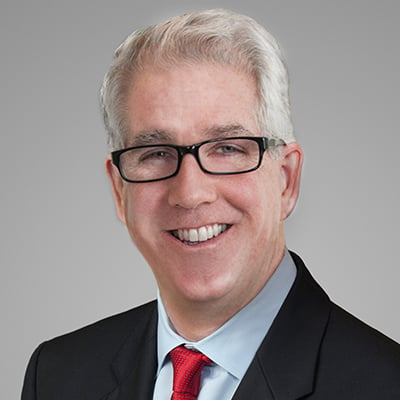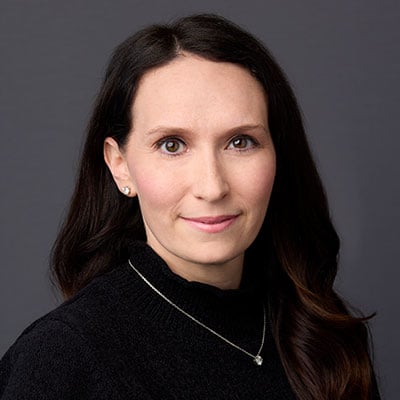Litigators of the Week: After Two Big Wins for Plaintiffs, a Defense Verdict for Infant Formula Makers
Jim Hurst participated in this Q&A as part of The Am Law Litigation Daily's "Litigator of the Week" feature. The Kirkland team, which was also led by Rebecca Fitzpatrick and Sierra Elizabeth, was recognized for its defense victory representing Abbott Laboratories in a trial over claims their baby formula causes illness in preterm infants. Covington & Burling was also recognized for advising Mead Johnson. The team also included Saghar Esfandiarifard, Zharna Shah and Katie Lencioni.
Earlier this year, Mead Johnson was hit with a $60 million verdict and Abbott Laboratories with an even larger $495 million verdict in trials linking the milk-based infant formula the companies make with necrotizing enterocolitis, or NEC—a life-threatening intestinal disease that affects premature infants.
This week, in a third trial bringing similar claims against both companies, a lawyer for the plaintiff asked state court jurors in St. Louis, Missouri, for $6.2 billion in punitive damages in closing arguments. But, after four hours of deliberations last week, jurors returned a complete defense verdict for the companies.
Our Litigators of the Week are Phyllis Jones of Covington & Burling, who represents Mead Johnson, and Jim Hurst of Kirkland & Ellis, who represents Abbott. They took leading roles for their clients both in the earlier losses and the defense win last week.
Late in the most recent trial, Hurst was barred from presenting evidence or making closing arguments by 22nd Judicial Circuit Judge Michael Noble, who sanctioned Hurst for "bad faith on several occasions." Kirkland partners Rebecca Fitzpatrick and Sierra Elizabeth handled closing arguments for Abbott.
What was at stake here for your clients?
Phyllis Jones: In financial terms, the stakes were massive: in closing, plaintiff's counsel asked for $6.2 billion in damages. But, more fundamentally, what is at issue in this litigation more broadly is the existential question that plaintiffs' counsel's allegations raise about these products. Preterm infant formula is not just a "nice to have" product. It is given to critically ill preterm babies—who must be fed—when, for some reason, a mother's breast milk or human donor milk is not available or insufficient to address acute growth needs. So, we are defending a critical NICU resource, something the American Academy of Pediatrics has described as a "routine and necessary part of care" for preterm babies.
Jim Hurst: Exactly. In fact, the FDA, the CDC, the NIH have joined the American Academy of Pediatrics—along with every doctor who testified at trial—in emphasizing that preterm formula is a critically important product for premature infants. When a mother's own milk and donor milk are either unavailable or insufficient, infant formula is essential to helping these fragile infants survive and thrive.
How did this matter come to you and your firm?
Jones: We were asked to get involved when it became clear that the cases were headed to trial.
Hurst: As this litigation expanded with more advertising to recruit more and more plaintiffs, Abbott asked me, Rebecca Fitzpatrick and Sierra Elizabeth to form a Kirkland team to join teams led by Steve D'Amore at Winston & Strawn and Shirlethia Franklin at Jones Day.
Who was on the defense team and how did you divide the work at trial?
Jones: I handled voir dire, opening statement and closing argument for Mead Johnson and covered several of the witnesses. The Mead Johnson team was co-led by my terrific partner, Emily Ullman, who handled a number of key witnesses, and we also had a number of fabulous Covington counsel, associate and paralegal colleagues involved: Kathleen Paley, Nicole Antoine, Alice Phillips, Elizabeth Fouhey, Sumner Truax, Ethan Treacy, Jake Nemetz, Ford Phelps, Julia Levko-Hontaruk and Dorielle Hammonds. Charissa Walker and Sherry Knutson from Tucker Ellis also handled witnesses and were wonderful contributors to the team. And, my partner Paul Schmidt, while not at trial, conducted a hugely important deposition of one of the plaintiff's causation experts, a portion of which we played in opening and closing. We divided and conquered with the Abbott team on the witness front, which worked really well.
Hurst: I handled voir dire and the opening statement and we shared witnesses with my co-leads, Sierra and Rebecca, both of whom were exceptional. Sierra and Rebecca also split the closing argument for Abbott. Linda Coberly from Winston expertly and tirelessly handled most of the arguments on the blizzard of motion practice that occurred throughout the trial. This trial win was truly a team effort by all three firms—Kirkland, Winston and Jones Day—as well as Abbott's internal legal group. I would normally name everyone who contributed to the winning effort. But this case was unique. Both inside and outside the courtroom, and dating from the outset of the case, there were far too many amazing contributions from incredibly talented lawyers from all three firms to list them all here.
You, your firms and your clients experienced significant losses in prior trials brought by plaintiffs linking NEC with these products. What did you learn in those earlier trials that helped you here?
Jones: It's always hard to say exactly what drives any particular trial outcome, but certainly we redoubled our focus on causation and did our best to highlight the realities of NICU medicine that inform the claims. One of those realities is that these are products administered by medical professionals in the NICU, often to babies who are receiving their nutrition through a tube, so the presence or absence of warning on a label does not have the same implications as it might with a traditional retail product.
Hurst: I agree with all of that. These cases also involve the most sympathetic plaintiffs anyone can imagine—premature infants who have suffered greatly from getting NEC, which impacts far too many infants regardless of whether they're fed human milk or formula. We've learned from our earlier trials that it's easy to distract juries from the science and causation. In this trial, for instance, the parties spent far too much time debating things like business models and marketing. None of that, in our view, had anything to do with what the jury was supposed to be deciding. So we tried to focus the jury on causation and exactly what the plaintiff had to prove to win.
What were your key trial themes and how did you try to drive them home with the jury during the trial?
Jones: Causation, causation, causation. We wanted to be clear that NEC is a devastating condition that, tragically, can affect all preterm babies, no matter what they are fed. In this case, the plaintiff had received an overwhelming amount of his mother's own breast milk, proving that point, but he also had a number of other risk factors for NEC independent of his feeding. We also tried to emphasize that a product this essential to NICU care could not be "unreasonably dangerous." The jury ultimately heard from seven different neonatologists, and everyone, including plaintiff's experts, said the same thing. These products save lives.
Hurst: Yes, it's all about causation. Along those lines, we emphasized preterm formula's long and well-established safety record. It's an FDA-regulated product that's been on the market for 45 years helping premature infants grow and survive when human milk is either unavailable or insufficient. Hundreds of clinical trials and thousands of scientific articles have confirmed its safety. Yes, human milk is preferred over our cow's milk-based formulas, including to protect against necrotizing enterocolitis or NEC. But that has been widely known for decades and taught in medical schools. If formula affirmatively caused NEC, as plaintiffs claim, there would be supporting evidence by now. There's not. If formula was an unreasonably dangerous product, as plaintiffs claim, it wouldn't be considered an essential medical option by every NICU in the world. It is.
In this particular case, the claim was that the plaintiff had been fed Abbott's product multiple times and Mead Johnson's product on a single day—"an ounce and a bit" as Phyllis said multiple times. These companies compete against each other in the broader formula market. How, if at all, did that affect the dynamics between the two defendants and your trial teams?
Jones: Not at all, in my view. Our clients are market competitors, but our trial teams had a shared perspective that we were going to win or lose together, so we worked very closely. I mean that literally—due to space constraints in the courtroom, we were seated at the same table for five weeks. The Abbott team is awesome. Jim is a truly fantastic lawyer, but was also a wonderful collaborator, and our teams had constant discussion about strategy, plenty of cheering each other on and figuring out how to collectively navigate challenges, and just generally got along.
Hurst: I had the same thoughts. Abbott and Mead are obviously fierce competitors outside the courtroom. But inside the courtroom, we were in it together. We worked together incredibly well and got along well too. It was a great experience trying a case with Phyllis. She's a phenomenal trial lawyer. One of the best. We couldn't have been more impressed with her and her entire team.
One defense lawyer who followed the proceedings told my colleague Amanda Bronstad that having St. Louis Children's Hospital as a codefendant in the trial likely helped the defense seem "a little bit more sympathetic" since the caregivers treating the plaintiff were implicated in the case. What do you think?
Jones: This was the unusual case where the hospital itself was a named party, but these products are administered by healthcare professionals in an intensive care environment under the order of a neonatologist, so the doctors are always important.
Hurst: I agree. Also the claim against Children's was about its feeding protocol, not about any individual caregiver. The plaintiff mostly ignored Children's in opening, and then told the jury in closing that it shouldn't allocate any liability to the hospital.
Jim, much of the sanctions discussion with the judge focused on reading from a consensus statement from the FDA and other regulatory bodies released around the start of the trial finding the absence of human milk, not exposure to infant formula, was responsible for increased risks of NEC. Lawyers for the plaintiff released a statement after the trial saying the conduct that led to you being sanctioned had "affected the fairness of the trial." What do you say to that?
Hurst: I've been trying cases for 35 years in courts throughout the nation and have never been accused of intentionally violating a court's orders before now. It was unfortunately a regular occurrence in this trial. The judge faced a tough trial with fierce advocates all doing our level best for our clients, and he readily dismissed the plaintiff's earlier accusations before finally relenting in the final days of trial.
I greatly respect the judge. He's a professional with a super tough job. But I respectfully disagree with his sanctions order. The part of my examination you highlighted in your question, for instance, did not even draw an objection at the time. Nor should it have. My question to the witness was about an underlying scientific fact, something that appears elsewhere in the scientific literature, too. I didn't even hint about what the court had excluded, which was that the FDA, the CDC and the NIH had issued a rare joint statement supporting the safety of infant formula. It's hard for me to understand how that could justify a sanctions order. I also have appreciated my firm's and my client's public support on the issue. In any event, what matters is the jury's verdict, which was the fair and just result.
Jones: Jim did a phenomenal job for his client, and I have absolutely no doubt in my mind that plaintiff received a fully fair trial from start to finish.
What will you remember most about this trial?
Hurst: I will never forget watching closing statements in this pressure-filled courtroom with over $6 billion at stake. With very little notice, Rebecca and Sierra had to take over closing arguments for Abbott. With nerves of steel and no hesitation—not one tiny bit—they both delivered in world-class fashion. I was in awe. And Phyllis's closing worked so well in combination with Rebecca's and Sierra's.
I've been in awe of Abbott's folks too. They've deftly led our large team with so much at stake in so many courts throughout the nation. And Abbott is doing the right thing and wants to be able to continue supplying this critical product to NICUs, where doctors, not lawyers, make the important medical decisions about when and how to use formula when treating premature infants.
Jones: This trial was uniquely memorable, so it's hard to pick one thing. But it was probably as stark an example as I've had of the reality that every day in trial brings the unexpected. And the difference between success and failure can be whether a team is able to pivot (sometimes multiple times) and find a way to win in the face of the unexpected. The ability of our teams to do that together was really gratifying.






